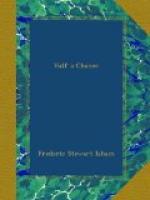“A privilege, Sir Charles, to meet one we have heard of so often, in the antipodes.”
“Thank you. His lordship, Judge Beeson, m’dear, whose decisions—”
“Allow me to congratulate you, sir!” The enthusiastic voice was that of Captain Forsythe, addressing John Steele. “Your cross-examination was masterly; had you been in a certain other case, years ago, when the evidence of that very person on the stand to-day—in the main—convicted a man of murder, I fancy the result then would have been different!”
John Steele seemed not to hear; his eyes were turned toward the beautiful girl. She was standing quite close to him now; he could detect the fragrance of the violets she wore, a fresh sweet smell so welcome in that close, musty atmosphere.
“My niece, your Lordship, Miss Wray.”
Steele saw her bow and heard her speak to that august court personage; then as the latter, after further brief talk, hurried away—
“Sir Charles, let me present to you Mr. Steele,” said Captain Forsythe. “Lady Wray—”
“Happy to know you, sir,” said the governor heartily.
“Miss Jocelyn Wray,” added the military man, “who,” with a laugh, “experienced some doubts about a visit of this kind being conducive to pleasure!”
John Steele took the small gloved hand she gave him; her eyes were very bright.
“I enjoyed—I don’t mean that—I am so glad I came,” said the girl. “And heard you!” she added.
He thanked her in a low tone, looking at her hand as he dropped it. “You,—you are making England your home?” His voice was singularly hesitating!
“Yes.” She looked at him a little surprised. “At least, for the present! But how—” she broke off. “I suppose, though, you could tell by my accent. I’ve lived nearly all my life in Australia, and—”
Sir Charles, interrupting, reminded them of an appointment; the party turned. A slender figure inclined itself very slightly toward John Steele; a voice wished him good morning. The man stood with his hands on his books; it did not occur to him to accompany her to the door. Suddenly he looked over his shoulder; at the threshold, she, too, had turned her head. An instant their glances met; the next, she was gone.
* * * * *
CHAPTER II
AT THE OPERA
When John Steele left the court toward the end of the day, he held his head as a man who thinks deeply. From the door he directed his steps toward Charing Cross. But only to wheel abruptly, and retrace his way. He was not an absent-minded man, yet he had been striding unconsciously not toward his customary destination at that hour, the several chambers at once his office and his home. For a moment the strong face of the man relaxed, as if in amusement at his own remissness; gradually however, it once more resumed its expression of musing thoughtfulness. The stream of human beings, in the main, flowed toward him; he breasted the current as he had for many evenings, only this night he did not look into the faces of these, his neighbors; the great city’s concourse of atoms swept unmeaningly by.




